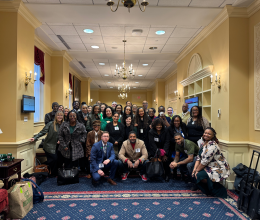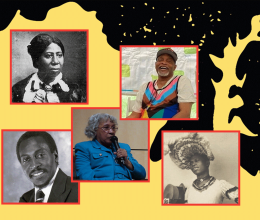In Pocomoke City, a small town on Maryland’s lower Eastern Shore with a centuries-long history of racial oppression, three Black officers have fought against racial abuse from white coworkers, supervisors, and officials. In 2016, Police Chief Kelvin Sewell, Lieutenant Lynell Green, and Detective Franklin Savage sued officials in Worcester County and Pocomoke City, challenging a conspiracy of race discrimination and retaliation. This week, Chief Sewell and Lt. Green reached financial settlements for the racism they endured while on the force, as well as a Consent Decree to bring reform to the Pocomoke City Police Department. But the fight for justice still continues for Detective Savage.
“I love my career in law enforcement,” said Detective Savage. “Well, I did love my career in law enforcement, before it was taken away from me.”
Detective Savage was the first and only Black police officer ever assigned to the Worcester County Criminal Enforcement Team – a regional drug-interdiction force made up of state and local law enforcement officers. For more than two years, Det. Savage endured racial slurs said in his presence by CET colleagues, including his supervisors.
“I noticed that I became the butt of a lot of jokes. Things were said, racially,” said Det. Savage. The racial abuse that he endured did not stop there, but worsened over time.
“During that time, I had locks. Once they found out what locks were, they looked at me as being dirty. If I touched something, they would clean it after me. They would wipe down door knobs,” said Detective Savage. “I was taken to a Ku Klux Klan meeting location, where I was told, ‘Don’t be surprised if you see a noose hanging from a tree.’”
Among numerous racial incidents, white officers secretly took a picture of Detective Savage eating watermelon, and then posted the photo around the office and placed it in his case files. A member of the CET placed an altered food stamp in Det. Savage’s desk drawer, with President Barack Obama’s image superimposed on it. And a bloody deer’s tail was placed on his car windshield by a member of the CET.
“Eventually, I felt like I was an outsider working with them,” said Detective Savage.
Detective Savage, along with Lieutenant Green, eventually filed discrimination complaints with the Equal Employment Opportunity Commission. “I knew I needed to file a complaint to protect myself,” said Det. Savage. “It was starting to affect me, my sleeping habits. I was having chest pains. And I was under a lot of stress.”
When Detective Savage finally filed complaints against local government and police officials and left the CET, he was suddenly railroaded out of law enforcement in Worcester County. Word about the his complaint over race discrimination soon spread in Pocomoke City, where he returned after being forced to leave the task force.
“Even people in the community knew what was going on,” said Detective Savage. “They’d say, ‘I’m glad you’re doing what you’re doing—we’re praying for you—but you know they hold all the cards here. There’s nothing you can do. This is not going to go anywhere. Eventually, all you’re going to do is get yourself fired or possibly get yourself killed.’”
Demoted without reason, despite a previously glowing employment record, Detective Savage was labeled incompetent and untrustworthy. “I was in an elite group where everybody wanted to be. I didn’t want to go backwards. I wanted to go forward,” said Det. Savage. “People respect you. They look up to you. They consider you to be somebody great.” But then suddenly because he spoke out against racism, “I’m a nobody again.”
Ultimately, Detective Savage was unlawfully fired by local leadership because of his complaints about racism. Pocomoke Police Chief Sewell was fired, too, for supporting Det. Savage and refusing to terminate him.
Following the settlement in Chief Sewell and Lieutenant Green’s cases, the federal court will enforce a Consent Decree aimed at reforming procedures and training at PCPD, in order to prevent future race discrimination and retaliation. Chief Sewell said, “While the scars from this experience will always be there, I am hopeful that this Consent Decree will help protect both officers and community members in the future. I also hope I can now move on with my life, while continuing to support Detective Savage in his ongoing fight.”
“It is our hope that by putting new policies and practices in place, others will be protected. No one should have to go through what we went through,” said Lieutenant Green. “This has been very hard. I’d never experienced anything like the discrimination in Pocomoke in my life. It ruined my career, and now I have to pick up the pieces and continue with my life.”
But the struggle for justice is not over. Detective Savage is continuing his fight against the unchecked racism he endured on the force. “I’m exposing those who think they can get away with things like this,” said Det. Savage.
“Ultimately, it’s the job of law enforcement to do the right thing and that’s what I always try to do,” said Detective Savage. “We put our lives on the line every day. Now, I’m in a fight for justice, and I am determined to hold those who have done wrong to me and my coworkers accountable for their actions.”









